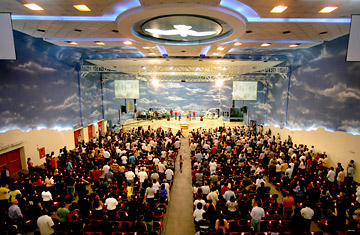
Brazilian evangelical followers pray inside the Renascer em Cristo church in Sao Paulo.
A Brazilian prosecutor has filed corruption charges against one of the country's best-known evangelical churches, seeking jail time for one of its leaders accused of overseeing the misuse of more than $1 million given to the church for literacy programs.
Prosecutor Sergio Suiama said the Renascer em Cristo Church, a multi-million dollar sect that counts Real Madrid soccer star Kaka amongst its most high-profile followers, had used government money to run religious education classes dressed up as literacy programs and had violated norms of "legality (and) honesty."
The Church's Renascer Foundation was given the money by the Education Ministry in 2003 to fund literacy work, according to court documents. Under the agreement, 23,000 people were to be taught how to read and write by 620 teachers hired by the church. Investigators, however, said they could not tell how many people actually benefited because the foundation did not provide proper lists of those involved. The group also refused to hand over receipts that would show how the money was spent.
The documentation provided by the church did, however, contain "unreal" information, Suiama said, such as an alleged 100% attendance rate on all its literacy courses. The money disappeared and the Church has refused to show where it went.
"There are two problems here," the prosecutor said. "One is suspicion of misuse of public money. They got 2 million reais and didn't account for it. The other was the use of public money to promote a religion, which is forbidden because this is a lay state."
A judge is about to rule in the case and if found guilty the foundation could be forbidden from receiving public money in the future.
Officials from the Renascer organization declined to be interviewed about the case. In a statement, however, they refuted the allegations and claimed the Education Ministry had itself praised their program in a published document. However, they could not provide a copy of the document and Suiama said he did not believe such a document existed.
Whatever the judge rules, the case raises serious questions about the running of the Renascer organization in particular and the status of Brazil's evangelical churches in general. The leaders of the Renascer empire — a married couple of self-styled 'bishops' whose ostentatious lifestyle drew comparisons with Jim and Tammy Faye Bakker — were sentenced to 10 months detention by a U.S. judge in 2007 after they were found guilty of failing to declare $56,000 in cash they tried to smuggle into Miami, some of which was hidden inside a bible.
Estevam and Sónia Hernandes face similar charges in Brazil relating from the same incident, and they have also responded to charges of money laundering and other crimes. The church itself also faces accusations it did not properly maintain a temple that collapsed last year, killing nine worshippers and injuring more than 100. A spokesperson did not respond to emails asking for comment on the charges.
For many Brazilians, the case raises the question of whether the country's churches should be allowed to continue to operate under such lax regulations, and as tax-exempt entities. Several other Protestant leaders have been found guilty of fiscal crimes, including those heading the Universal Church of the Kingdom of God, one of Brazil's biggest and richest dominations. A prominent pastor in yet another Evangelical church, the World Church of the Power of God (Igreja Mundial do Poder de Deus), last month told Época newsmagazine he was ordered to manipulate bible passages in order to squeeze more money from followers.
Officials from neither church responded to emails and telephone calls asking for comments about the matters.
Analysts say that the popularity of Evangelical churches preaching that the achievement of material prosperity is not a sin helps explains the huge rise in the number of Protestants in Latin America. In Brazil, a nation that three decades ago was almost entirely Catholic, Protestants today account for almost one in five people. But the blurring of the line between the spiritual and material worlds provides pastors with a particularly acute temptation to succumb to greed, academics said.
"I think Renascer presents one of the dark sides of the prosperity theology," said Manuel Arturo Vasquez, associate professor of religion and the University of Florida, Gainsville and a specialist in Brazil's Neo-Pentecostal sects. "The good side is that it gives people hope and empowers them to feel they have some control over their lives. The negative side is once you make explicit the link between the material and spiritual worlds there is plenty of room for abuse. And what you are seeing in Renascer and the Universal Church of the Kingdom of God is that people are using some of the resources that the congregation provides for their own profit-making enterprises."
Prosecutors and academics were careful not to tar all Brazil's Evangelical sects with the same brush with one investigator saying he had come across other churches with even more sophisticated schemes for laundering money and evading taxes than Renascer's. However, Arthur Lemos, a state prosecutor in São Paulo who has investigated several cases against the sects, said the Hernandes were emblematic in that despite their public piety they are more in thrall to cash than Christ.
"They are avaricious when it comes to money," Lemos said. "They do not earn a lot of money but they live a lavish lifestyle. The money they have is in the names of others. Anyone who denounces them is accused of being in league with the devil."
